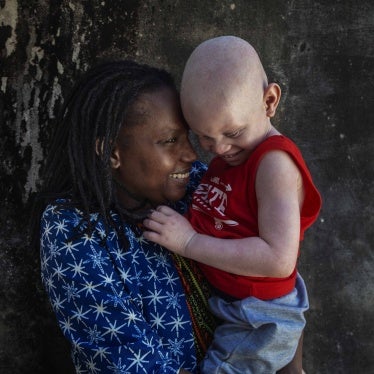The Secretary
Expert Committee on the Selection and Use of Essential Medicines
Essential Medicines team (EML)
Department of Health Products Policy and Standards (HPS)
Access to Medicines and Health Products Division (MHP)
Re: Urgent Support for the Inclusion of SPF50+ Broad Spectrum Sunscreen in the World Health Organization Model List of Essential Medicines
Dear Madam/Sir,
Please accept my greetings on behalf of Human Rights Watch, an independent non-government organization that works to improve human rights in countries around the world.
Human Rights Watch writes to express our strong support for the application “A.25 sunscreen” submitted by the UN Independent Expert on the enjoyment of rights by persons with albinism and partners for the inclusion of SPF50+ broad-spectrum sunscreen in the World Health Organization (WHO) Model List of Essential Medicines (EML) and the Model List of Essential Medicines for Children (EMLc).
In 2022, the WHO recognized the crucial public health benefits of sunscreen in reducing the incidence of skin cancer among persons with albinism. However, the initial application was not accepted due to a request for further details on the sunscreen’s ingredients. The Independent Expert, together with the Global Albinism Alliance, the Special Rapporteur on the Promotion and protection of human rights in the context of climate change, the Africa Albinism Network, alongside other partners, have now addressed these concerns in a resubmitted application. Given the substantial evidence now provided, the WHO should act to ensure sunscreen’s inclusion in the EML.
Human Rights Watch has documented the challenges faced by persons with albinism in accessing essential health services and protective products, particularly in regions where sun exposure is unavoidable.
For instance, in Mozambique, we met Josina, an eight-year-old child whose most-desired gift was sunscreen. However, like many other children with albinism, Josina had to rely on a local, volunteer-run non-profit, Azemap, for access to sun protection.
Adults face similar challenges. Luisinho, a 26-year-old, had to quit his job selling second-hand clothes on the street because he could not afford sunscreen, leading to painful and dangerous sunburns. Their experiences are not isolated cases but rather reflective of systemic barriers to sun protection for persons with albinism.
The inclusion of SPF50+ sunscreen in the EML aligns with the WHO’s criteria for selecting medicines: to satisfy the priority health care needs of the population, and to be available within functioning health systems at all times, in adequate amounts, in the appropriate dosage forms, of assured quality and at prices that individuals and the community can afford. Including SPF50+ sunscreen is therefore a necessary step to prevent avoidable harm and uphold the right to health for persons with albinism. Ensuring that this product is available in public health programs will significantly improve accessibility and prevent further health disparities.
Moreover, ozone depletion increases UV radiation exposure, making sun protection more urgent than ever. For persons with albinism, who are already at disproportionate risk of developing skin cancer, the combination of rising temperatures and prolonged sun exposure makes access to SPF50+ sunscreen essential for their health and well-being. The WHO should recognize this growing risk and act accordingly.
In its previous review, the WHO Expert Committee acknowledged the public health benefits of sunscreen. Now that the necessary ingredient details have been provided, there is no justification for further delay in adding SPF50+ sunscreen to the EML.
Beyond health impacts, the lack of accessible sunscreen undermines the economic, social and cultural rights of persons with albinism. For instance, without adequate sun protection, children struggle to attend school safely and adults are often forced to leave jobs that require outdoor work. Exclusion from education and employment due to preventable sun damage is a violation of human rights.
We call on the WHO to act on the evidence and lived experiences of persons with albinism. Ensuring access to SPF50+ sunscreen is not only a medical necessity—it is a human rights imperative. We urge the WHO Expert Committee to approve this application without further delay.
Thank you for considering this urgent matter. Should you have any questions or require further information, please do not hesitate to contact us.
Best regards,
Samer Muscati
Deputy Director
Disability Rights Division
Human Rights Watch








